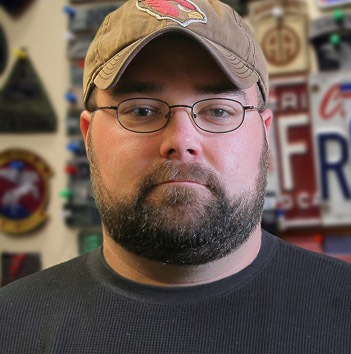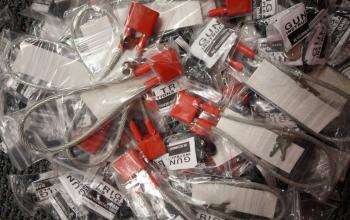
Leaton Jones
On September 11, 2001, Leaton Jones was serving on active duty in Germany. When the US invaded Iraq on March 20, 2003, he was a medic in Kuwait. Today, he is back home studying for his undergraduate degree in public health. But now armed with first-hand knowledge of what guns can do, Jones has affected hundreds of lives with one simple inspired letter.

As evidenced by this brimming box of free gun locks, Leighton Jone's simple letter has resulted in safer gun storage in hundreds of homes.
More often than not, big ideas start with a simple, small inspiration.
That’s how it happened for Operation Iraqi Freedom veteran and UA public health student Leaton Jones. When he came back stateside and started his studies at the UA, he got involved with the Veterans Education and Transition Services (VETS) Office, a program that offers support to help alumni of the US Armed Forces achieve success during their time at the university.
Today, the UA VETS program has become a national model for delivering services to veterans, incorporating student life, counseling, academics, disability resources, and state and national advocacy. Last year, the UA Chapter of the Student Veterans of America was named “Chapter of the Year” at the organization’s annual conference in Washington, D.C.
As an experienced soldier and medic, Jones knew first-hand what guns can do. “I had shot guns here and there throughout my life, but I never owned one until I joined the military,” he says.
According to the Veterans Administration’s latest figures, over 70% of veterans own and store firearms in their homes. Statistically, combat veterans are four times more likely to own guns than the average citizen. “I’ve got a lot of friends up in the VETS Club. A lot of them have kids and not a lot of money,” he says. Jones recognized that this was a recipe for disaster.
According to the 2002 report Injury Facts published by the National Safety Council, in 1999 alone 3,385 children aged 0-19 years were killed with a gun. Of those, most were aged 15-19, but 416 were aged 5-14. Seventy-three were children under five years old.
Learning of these statistics, Jones saw a clear need and wanted to make a difference. So he sat down and wrote an email. On September 23, 2010, he sent a short message to three different manufacturers of gun safety equipment:
I am currently a student at the University of Arizona majoring in Public Health. I am also a US Army Veteran. Currently the University of Arizona has one of the largest veterans’ organizations in the country among other universities. Being a public health major and a veteran I am concerned with the well being of my fellow veterans. I am seeking donations of firearm locks in an attempt to promote firearms safety. These locks will be distributed through the Veterans Education and Transition Services (V.E.T.S.) office on campus. Currently the V.E.T.S. office sees about 150 veterans daily and continues to grow. Thank you for your time and consideration.
Respectfully,
Leaton Jones
Three weeks later, Jones received a box containing 350 gun locks. “I just drew up a pamphlet with steps for gun safety and the statistics and just started passing everything out.”
On his first day, Jones distributed fifty locks. “I had to go and restock the box in the Veterans’ Club each week, so that’s good,” he says. His contributions haven’t stopped there.
“Mr. Jones also facilitated information sessions so that anyone with questions about firearms safety had an opportunity to learn in a convenient and professional manner,” writes Matt Randle, fellow veteran and director of the UA VETS Office. “I cannot express to you how needed and appreciated these efforts are in our community.”
Along with his active involvement with the VETS Office on campus, Jones plans to graduate with his degree in public health in December of 2011.
We wish him all the best, and thank him – along with all his brothers and sisters in arms – for their selfless gifts.
To learn more about the nationally-recognized UA VETS program, visit https://vets.arizona.edu/.








